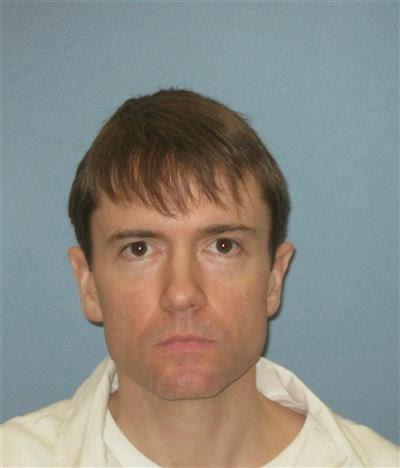
Ryan Gerald Russell
Anthony Ray Hinton was freed last Friday after spending almost 30 years on Alabama's death row for two murders that new forensic evidence indicates he did not commit. We strongly suspect Hinton was not the only inmate wrongfully serving time on Alabama's death row. And we aren't just guessing about that; we have a specific case in mind.It's the case of Ryan Gerald Russell, an Inverness man who was convicted in the 2008 shooting death of Katherine Helen Gillespie, his 11-year-old cousin. A Shelby County jury deliberated 35 minutes before convicting Russell and recommended a death sentence. Circuit Judge J. Michael Joiner, now on the Alabama Court of Criminal Appeals, sentenced Russell to death in December 2010. Russell is housed on death row at Holman Prison.
But was this a case of murder? And, as was the case with Anthony Ray Hinton, is there any evidence tying Russell to the shooting? Based on press reports at the time, the answer to the first question is "maybe not." The answer to the second question is "no."
Are there similarities between the Hinton case and the Russell case? Well, here is how al.com described the process that set Hinton free:
After nearly 30 years on Alabama's death row, Hinton this morning walked out of prison a free man and into the arms of his sisters and friends.
He was freed when prosecutors dismissed the charges for his re-trial in the 1985 deaths of two fast-food managers after new testing on Hinton's gun couldn't prove the crime scene bullets were fired from the weapon.
Bryan Stevenson, executive director of the Equal Justice Initiative (EJI) in Montgomery, served as Hinton's attorney and pushed for the evidence that finally freed his client:
EJI has been asking for more than a decade for prosecutors and the Alabama Attorney General's Office to have the gun re-tested because Hinton's original attorney did not hire a qualified gun expert.
"It should have happened many many years ago. . . . His case, in my judgment, is a case study in what's wrong with our system. He was convicted because he is poor. We have a system that treats you better if you're rich and guilty than if you're poor and innocent," Stevenson said.
There is no evidence that Russell's court-appointed trial lawyers hired a gun expert, qualified or not. In fact, Russell's lawyers, Mickey Johnson and Rick Vickers of Pelham, put on no defense at all. We can find no documents on Google Scholar that indicate Russell's conviction was appealed. News reports at the time raised questions about whether the prosecution even had the right murder weapon--and the reports offered no forensic evidence that showed Russell fired the gun.
What led to Katherine Gillespie's death? Here is how we summarized it in a November 2010 post:
The death of Katherine Helen Gillespie is a sad and tragic story. She was born through artificial insemination to a mother who died when she was 7 years old. She did not have a father, so she lived with her maternal grandmother until the summer of 2007. At that point, the grandmother developed signs of dementia, and Gillespie came to live in Inverness with the 37-year-old Russell, a distant cousin who was single and reportedly planned to adopt her.
Katherine Gillespie had been at summer camp on June 16, 2008, and it appeared Russell was going to be late picking her up. A camp counselor later testified that Gillespie was concerned as it got closer to 6 that evening, and Russell had not picked her up, but she was happy and smiled when he made it on time.
Three teenagers reported later that evening being rear-ended by an SUV. When they followed the SUV, it went to Russell's residence. Two of the teens, Andrew Stone and Robert "Bo" Montiel, later testified that a young girl, presumably Gillespie, got out of the SUV and asked them in a tearful voice not to call the police about the collision. They said Russell stayed in the vehicle and eventually backed it into the garage.
One of Russell's ex girlfriends went to the house after relatives told her they had not been able to reach him for several days. She discovered Katherine's body inside the SUV.
Was there reasonable doubt in the Russell case? Evidence showed that Russell had financial problems and a serious drinking problem, but reasonable doubt about murder--and whether he committed it--was everywhere. Consider just a few issues raised at trial:

Katherine Helen Gillespie
* Don Gould, a retired evidence technician, admitted under cross examination that his team left behind four guns at the scene, including the one they eventually considered to be the murder weapon. That gun, a .40-caliber Glock, was found months after evidence recovery, hidden under a couch when a family member of Russell's removed his belongings from the house.* Ed Moran, a forensics expert, could not connect the bullet from the body to any gun that he examined. From a January 2011 post and an article in the Shelby County Reporter:
Moran said the bullet jacket recovered from the body could not be marked back to any of the guns he examined. He said there was not enough microscopic markings on the jacket for him to make a conclusion.
* Katherine's body was found in Russell's house, where she lived, and he was her legal guardian. The supposed murder weapon was found there--one of 37 guns recovered at the scene. But that's pretty much where the evidence against Russell ends. We see no sign that he intended to kill Katherine, nothing tying him to the murder weapon. Does this evidence even rise to the level of "flimsy"? But a man sits on death row because of it? Here is how we summarized it:
Here is perhaps the most stunning element of this case: Based on press reports, from both The Birmingham News and the Shelby County Reporter, no evidence was presented that tied Russell to the actual act of shooting Gillespie. Articles about the testimony of a forensics expert made no mention of fingerprints, powder residue, or any other evidence that proved Russell fired the weapon. Yes, the gun was found in Russell's house. But proof beyond a reasonable doubt that he fired the gun? If any was presented at trial, it was not reported in the press.
Russell and Gillespie hardly were alone on the property that night, as we reported:
Based on press reports, we know that at least six other people--a former girlfriend, three teenagers, and at least two sheriff's deputies (called first by the teens, then by the former girlfriend)--were on or near the Russell property that night. . . . Is it possible that someone else on the scene that night had a gun and accidentally shot Katherine? It appears that authorities never seriously considered that possibility, and of course, that scenario would not go to murder either. It might, however, go to a massive wrongful-death lawsuit against the persons or entities responsible.
It took the Alabama "justice system" 30 years to get the Anthony Hinton case right. The Ryan Russell case emits many of the same foul odors. How long will it take for someone to take a second look? Has there even been a legitimate first look yet?
